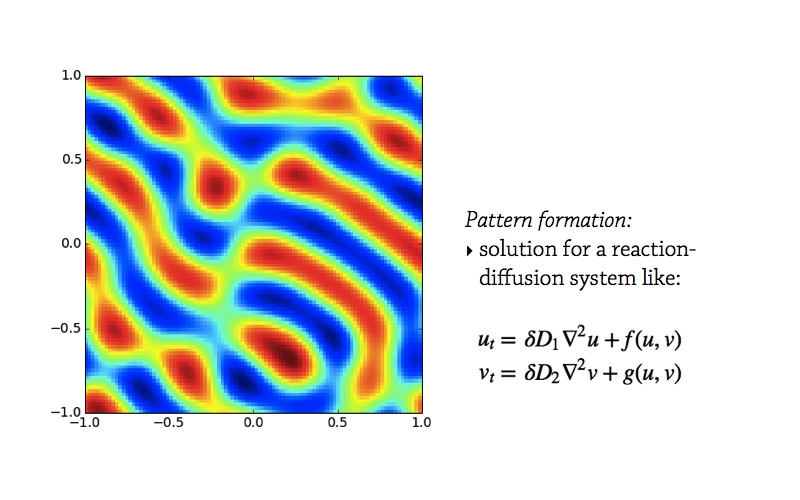Announcing "Practical Numerical Methods with Python" MOOC

An example of the types of problems we will learn to solve in this course, among others governed by differential equations.
Aug. 6—New! Course site now open for registrations!
As announced at SciPy 2014 (July 8), I will be teaching a numerical methods course at GW this Fall semester that will be connected with three other courses around the world, and also with an independent MOOC titled "Practical Numerical Methods with Python."
This is a collaboration between myself, GW's Academic Technologies and the office of the Vice Provost for Online Education and Academic Innovation, and:
- Ian Hawke, Centre for Doctoral Training in Next Generation Computational Modelling, Southampton University (UK)
- Carlos Jerez, School of Engineering, Pontifical Catholic University of Chile, Santiago (Chile)
- David Ketcheson, Mathematical and Computer Sciences & Engineering Division, KAUST (Saudi Arabia)
[ UPDATE : David Ketcheson had to bow out of this project, after his course got cancelled at KAUST. ]
It will be a groundbreaking example of inter-institutional (across four continents!) collaboration in open education. Although the MOOC will be run from GW, all four instructors will be collaborating openly in the development and design of course content and learning objects, and all materials will be released under open licensing models (content under Creative Commons Attribution CC-BY 4.0 and code under MIT license).
The associated MOOC will be independent of any of the well-known providers: we will deploy our own instance of the Open edX software on cloud hosting services to offer a MOOC without surrendering our IP to for-profits nor subjecting students to creepy data mining. We believe that higher education is the core mission of universities and we want to contribute to open education with for-profit companies having only a supporting role.
On campus, the partner instructors will manage their course as they see fit, but we share in the ideal of increasing engagement and active learning. We will join in scholarly conversations aiming to develop the best course materials that we can muster, and course activities that will keep students engaged and encourage participation.
The connected courses and MOOC are aimed at first-year graduate students or advanced seniors, but assume only a background in vector calculus, linear algebra, and differential equations. We won't assume more than a beginner's programming experience and will guide students to develop a foundation in numerical methods, and hands-on experience coding up solutions to differential equations.
The course aims for students to achieve the following:
- connect the physics represented by a mathematical model to the characteristics of numerical methods to be able to select a good solution method;
- implement a numerical solution method in a well-designed, correct computer program;
- interpret the numerical solutions that were obtained in regards to their accuracy and suitability for applications.
As the name implies, the course will use the Python language throughout. We will collaboratively develop learning modules consisting of several lessons written as IPython Notebooks. They will be hosted openly on GitHub and will keenly accept issues and pull requests from students, MOOC participants and observers. In other words, we adopt and embrace the open-source model in our educational endeavor.
We adopt and embrace the open-source model in our educational endeavor.
The instructional team will build on previous experience that gives us confidence on the success of the initiative. As many of my gentle readers know, I have been sharing my teaching artifacts for years, with all my courses at Boston University on iTunes U. Recently, I have released two sets of lessons on IPython Notebooks:
- CFD Python (July 2013)
- AeroPython (April 2014)
The partner instructors have also developed collections of IPython Notebooks, openly shared:
- David Ketcheson's HyperPython (May 2014)
- Ian Hawke's Numerical Methods (June 2014)
We are thus building on this past experience to move forward an exciting venture in connected teaching and learning, and we want to invite you and every one who is interested in scientific computing to learn (and teach) with us.
It's going to be a "do-it-yourself" adventure, and we expect to encounter snags and make mistakes. But we are convinced that a fully open and connected model for learning is adaptable and self-healing, so we have no worries.
What do you think? Leave us your comments here! And stay tuned for a follow-up announcement with the link to our course platform on the cloud. Coming soon!
Follow Prof. Barba on Twitter to be the first to know of the site launch.
Acknowledgements
This project is supported by the GW Vice-Provost of Online Education and Academic Innovation and the School of Engineering and Applied Sciences. Prof. Barba's educational program is supported by the NSF CAREER award.
Professional services and technical support by IBL Studios Education.
